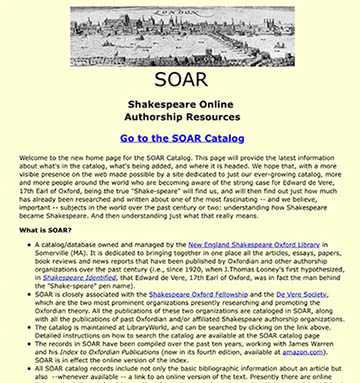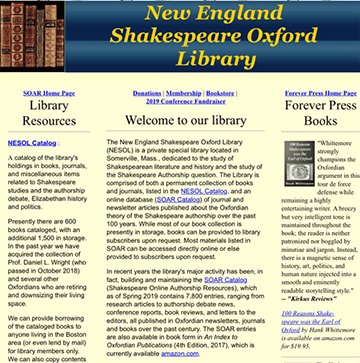Part 1 of a 2-part article
By the SOF Data Preservation Committee

Roll over, Stratfordian researchers. SOAR (Shakespeare Online Authorship Resources, soarcat.com), the digital research engine dedicated to all Oxfordian and SAQ publications, allows Oxfordian researchers to soar like never before. The database currently lists more than 8,400 bibliographic records, with further advances on the horizon. The contents of internet publications, including websites and digitized books, will soon add thousands of new records. Subject headings in all records will have an SAQ twist, and SOAR will gain a Google presence.
SOAR, founded in 2007, has been a labor of love for DPC members Bill Boyle and Catherine Hatinguais. “Our goal was to provide the Oxfordian research community with an all-purpose database similar to JSTOR [a digital library of academic journals and books], but specializing in resources not included in JSTOR,” explains Hatinguais, SOF Trustee and SOAR’s chief abstract writer. “Inclusion of any article or news item in SOAR is based on its relevance to the authorship issue, rather than its appearance in a core of Shakespeare-related publications.”
Adds SOAR founder Boyle, “We’ve added approximately 6,100 records that cover the full contents of 15 major Oxfordian publications (newsletters and journals) since 1920 including those listed in Jim Warren’s An Index to Oxfordian Publications. The new additions comprise not just major research articles but also shorter articles, research notes, news items, book reviews, reports on conferences and meetings held since the 1930s, and letters to the editor.” About 2,300 records originated in more than 100 major international publications, ranging from The New York Times to The Times of India and The Folger Shakespeare Library’s Shakespeare Quarterly.

A hardcopy of everything listed in the catalogue is carefully preserved in the New England Shakespeare Oxfordian Library (NESOL), which is curated by Boyle. Wherever possible, entries are linked to online copies. Where copies are not available, SOAR can provide digital scans of documents for research purposes.
Boyle and Hatinguais’s work continues on. They will soon tackle digital resources, websites, and archival sites in addition to creating more relevant subject headings. “SOAR uses the existing Library of Congress subject headings as much as possible, but they are woefully inadequate for the Shakespeare authorship issue. Some adjustments had to be made, and we are in the process of formulating and standardizing our own ‘local’ labels,” says Hatinguais.
Also in the forefront, creating a stronger public presence. “At present only members of our Oxfordian community use SOAR, and each month hundreds of searches are done. However, the catalog does not turn up in Google searches,” says Boyle. “But we are working on making it visible on Google soon.”
In Part Two of this article, coming soon, Boyle and Hatinguais will share their SOAR search tips. One of their tips may be just what you need to unlock another Oxfordian mystery.


